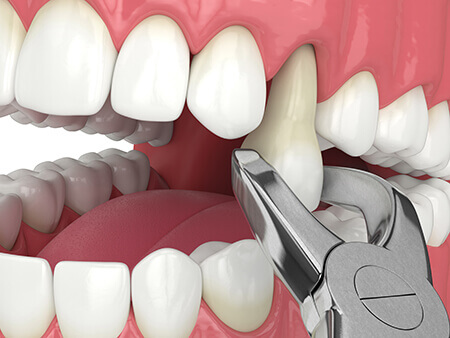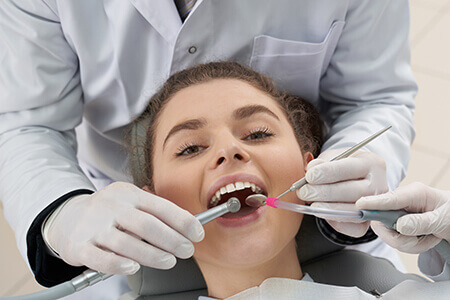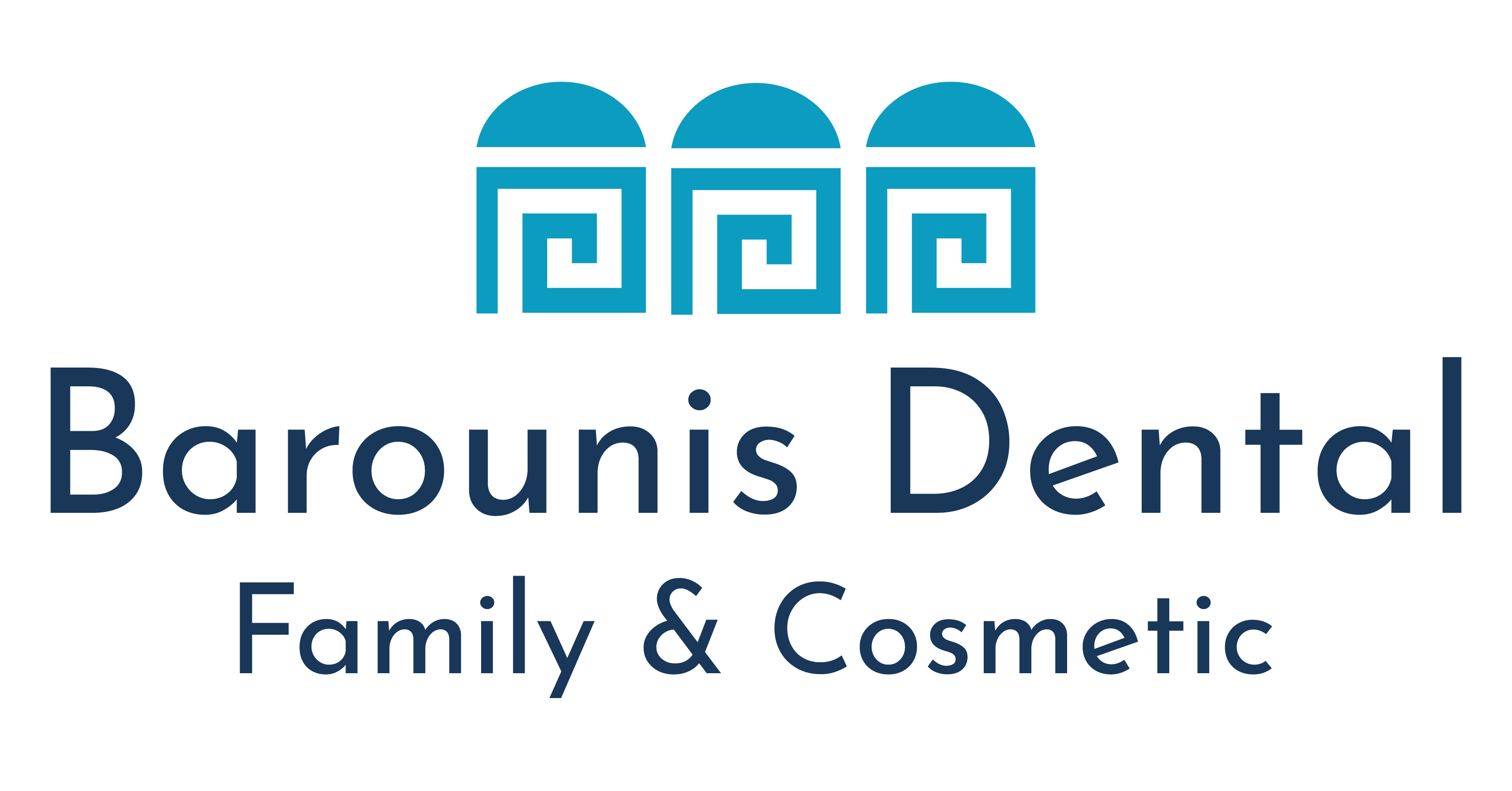Specialty Dentistry
While our top priority at Barounis Dental is to provide you and your family with the best possible dental care, there are times when you may need the services of a specialty dentist. If you need a specialty dentist, we will refer you to a trusted and knowledgeable provider of specialty dental care.
Simple & Surgical Extractions
Simple Extractions

Simple extractions can be done in our office by one of our skilled dentists. Simple extractions can be performed on a tooth that is visible in the mouth and above the gum line. Simple extractions are quicker and require less recovery time than a surgical extraction.
Surgical Extractions
If your dentist at Barounis Dental thinks you require a surgical extraction, we may refer you to a qualified oral surgeon. Oral surgeons are able to remove a tooth from below the gum line.
Surgical extractions usually involve opening the gum and extracting the tooth. To make you more comfortable, an oral surgeon may suggest using general anesthesia for this type of extraction.
Periodontics
Gum Disease

Many adults have some level of gum disease. Gum disease is caused by poor brushing and flossing habits that allow plaque – a sticky film of bacteria- to build up on teeth and harden, causing inflammation.
Gingivitis is an early phase of gum disease which causes irritation, redness and inflammation of the gingiva, the part of your gum around the base of a tooth. Gingivitis can lead to more serious forms of gum disease, like periodontitis or tooth loss.
Some of the causes of gingivitis include poor oral hygiene and smoking. Your risk of developing gingivitis may also increase due to certain health conditions, genetics, diet, and stress.
A more severe form of gum disease is periodontitis. Periodontitis is a serious gum infection that damages the soft tissue of the gums. Without treatment, periodontitis can destroy the bone that supports your teeth, leading to loose teeth or even tooth loss.
Periodontitis has also been linked to serious health conditions such as diabetes, heart disease, respiratory disease, pregnancy complications, Alzheimer’s disease, and even some cancers.
Signs of Gum Disease
Common signs of gum disease include:
- Bad breath or a bad taste that won’t go away
- Tender or bleeding gum
- Red or swollen gums
- Receding gums
- Loose teeth
- Painful chewing
Prevention and Treatment of Gum Disease
To prevent or reduce your chance of developing gum disease we recommend following a regular home oral hygiene routine, including twice daily brushing for at least two minutes each time, daily flossing, and coming into our office bi-annually for comprehensive oral health visits.
Your dentist at Barounis Dental will assess the health of your gums at your oral health visits. At these visits, we examine and measure your gums, looking for signs of gum disease.
If we see signs of developing gum disease, our dentists will work with you to ensure you receive appropriate treatment for your gum disease. In some cases, a referral to a periodontist, also known as a gum specialist, may be necessary.
Endodontics
Endodontic Treatment

Barounis Dental may recommend endodontic treatments if you have a tooth that has extensive decay within the tooth. Our team performs simple endodontic procedures but in the case of more complex endodontic procedures, as well as molar endodontic therapy, we will refer you to an endodontist. An endodontist is a dentist who specializes in treating tooth pain and in saving teeth that have become severely infected or diseased.
Typically, endodontic treatments involve removing the dental pulp inside the tooth. The dental pulp is located in the middle of the tooth and is comprised of cells, blood vessels, and connective tissue. Root canal therapy or root end surgery may be needed to save the infected tooth.
After removing the pulp, your endodontist will clean and fill the area where the decayed pulp was removed and cap the tooth with a filling or crown.
Your dentist at Barounis Dental may recommend endodontic treatment if we see signs of infected or inflamed pulp deep inside the tooth in the x-rays we regularly take of your teeth. Infection or inflammation of the pulp can be caused by decay, cracks, injuries, or if dental procedures have caused damage to the tooth.
If you feel ongoing pain, sensitivity, tenderness, or drainage from any of your teeth, it is important to talk to your dentist as soon as possible. Early detection of gum disease leads to better outcomes.
Recovery After an Endodontic Procedure
As endodontic treatment can be invasive, recovery times can vary, depending on the procedure that is performed. You may feel sensitivity and discomfort for a few days after an endodontic treatment, which can usually be managed with over-the-counter medications.
Your endodontist and their team will give you exact instructions to follow for proper healing after an endodontic procedure. Strictly following these instructions helps avoid post-treatment complications and promotes timely healing.
Implants
Dental Implants

Dental implants are a permanent solution to replace missing or damaged teeth. Dental implants consist of two parts: a titanium screw that is attached to your jawbone and an artificial ceramic tooth that replaces the missing or damaged tooth and maintains the alignment of your teeth. Dental implant procedures are performed by a qualified periodontist.
We will recommend a dental implant for you if you have a tooth that is missing or a tooth that is severely damaged. Dental implants can be used to replace a single tooth, multiple teeth if three or more teeth are missing in a row, or for full arch reconstructions. In certain cases, we would recommend dental implants as anchor teeth for dentures.
The Benefits of Dental Implants
Dental implants are a permanent, long-lasting replacement for missing teeth or a damaged tooth that needs to be removed. Dental implants maintain the alignment of your teeth, decrease the chances of jawbone deterioration due to missing teeth, and help you maintain a fully functional bite.
Planning Dental Implant Treatment with CBCT Imaging
Prior to your dental implant treatment, Barounis Dental will take a three-dimensional x-ray image of your teeth and jawbone using our innovative CBCT x-ray technology. CBCT, which stands for Cone Beam Computed Technology, produces images that allow us to not only examine your tooth structure, but also the nerve pathways, soft tissue, bone health, and more leading to less invasive surgeries with more accurate results.
CBCT scans are painless and take less than a minute to complete. Our in-house CBCT machine takes images by using a rotating scanner, capturing multiple images as it rotates around your head. The CBCT technology then combines these multiple images into a single, comprehensive image of your teeth and jaw. Like our other digital x-ray technologies, CBCT imaging exposes our patients to less radiation than conventional x-rays.
We then use the highly detailed CBCT image to virtually place dental implants into the optimal position prior to implant treatment. Our ability to precisely pre-plan implant treatment results in more predictable, better outcomes during your surgery, implant placement, recovery, and the final seating of your implant crowns.
The Dental Implant Procedure
Depending on your specific dental implant needs, the time it takes for dental implants varies. You may need to see another dental specialist before you have a dental implant procedure.
Once your mouth is ready for the dental implant procedure, your periodontist will implant the titanium screw and then scan your mouth to create an exact digital image of the tooth to be replaced. You will leave your first visit with a temporary artificial tooth.
Once the permanent tooth for the dental implant has been created, you return for a second appointment where your periodontist removes the temporary tooth and attaches the permanent ceramic tooth to the titanium screw.
Recovery Times After Dental Implants
The recovery time for most dental implants is short, usually 1 to 2 days. More involved implant procedures, like ones involving a bone graft, can take around 1 to 2 weeks.
At Barounis Dental, we want to help you get the best possible dental care for your individual dental needs. If you need a dental specialist, we are here to refer you to the best possible specialist.
If you think you need to see a dental specialist, schedule an appointment with one of the members of the Barounis Dental team in Foxborough, MA, today!
